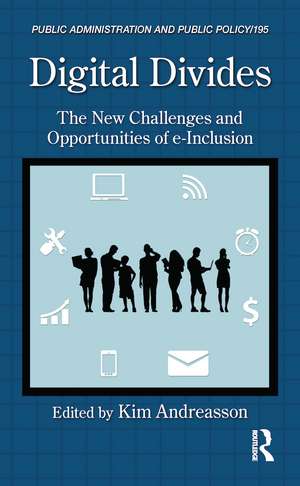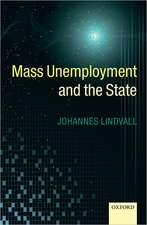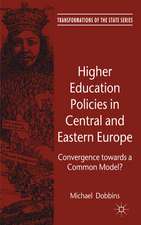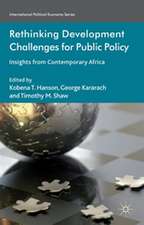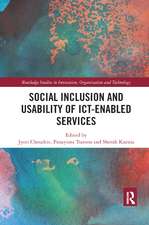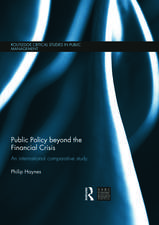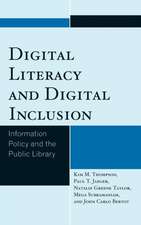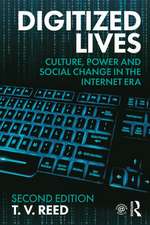Digital Divides: The New Challenges and Opportunities of e-Inclusion: Public Administration and Public Policy
Editat de Kim Andreassonen Limba Engleză Hardback – 14 ian 2015
Din seria Public Administration and Public Policy
- 8%
 Preț: 392.09 lei
Preț: 392.09 lei -
 Preț: 387.96 lei
Preț: 387.96 lei - 9%
 Preț: 586.71 lei
Preț: 586.71 lei - 8%
 Preț: 421.49 lei
Preț: 421.49 lei - 8%
 Preț: 428.07 lei
Preț: 428.07 lei - 9%
 Preț: 2419.59 lei
Preț: 2419.59 lei - 18%
 Preț: 1491.92 lei
Preț: 1491.92 lei - 25%
 Preț: 1198.87 lei
Preț: 1198.87 lei - 27%
 Preț: 617.83 lei
Preț: 617.83 lei - 22%
 Preț: 458.73 lei
Preț: 458.73 lei - 18%
 Preț: 1812.76 lei
Preț: 1812.76 lei -
 Preț: 470.32 lei
Preț: 470.32 lei - 44%
 Preț: 501.80 lei
Preț: 501.80 lei - 24%
 Preț: 425.72 lei
Preț: 425.72 lei - 18%
 Preț: 2377.47 lei
Preț: 2377.47 lei - 15%
 Preț: 615.12 lei
Preț: 615.12 lei - 15%
 Preț: 576.47 lei
Preț: 576.47 lei - 25%
 Preț: 683.99 lei
Preț: 683.99 lei - 15%
 Preț: 503.94 lei
Preț: 503.94 lei - 25%
 Preț: 830.92 lei
Preț: 830.92 lei - 23%
 Preț: 457.91 lei
Preț: 457.91 lei - 28%
 Preț: 682.77 lei
Preț: 682.77 lei - 25%
 Preț: 352.95 lei
Preț: 352.95 lei - 18%
 Preț: 1557.29 lei
Preț: 1557.29 lei - 27%
 Preț: 1062.55 lei
Preț: 1062.55 lei -
 Preț: 325.14 lei
Preț: 325.14 lei - 25%
 Preț: 750.25 lei
Preț: 750.25 lei - 15%
 Preț: 564.96 lei
Preț: 564.96 lei - 15%
 Preț: 675.86 lei
Preț: 675.86 lei - 18%
 Preț: 1511.65 lei
Preț: 1511.65 lei - 18%
 Preț: 702.31 lei
Preț: 702.31 lei - 23%
 Preț: 331.19 lei
Preț: 331.19 lei - 18%
 Preț: 791.91 lei
Preț: 791.91 lei - 15%
 Preț: 703.08 lei
Preț: 703.08 lei - 18%
 Preț: 794.30 lei
Preț: 794.30 lei - 27%
 Preț: 501.77 lei
Preț: 501.77 lei - 27%
 Preț: 701.54 lei
Preț: 701.54 lei - 27%
 Preț: 864.47 lei
Preț: 864.47 lei - 24%
 Preț: 467.74 lei
Preț: 467.74 lei - 25%
 Preț: 501.45 lei
Preț: 501.45 lei - 18%
 Preț: 912.47 lei
Preț: 912.47 lei - 15%
 Preț: 598.05 lei
Preț: 598.05 lei - 28%
 Preț: 1016.07 lei
Preț: 1016.07 lei - 9%
 Preț: 1192.62 lei
Preț: 1192.62 lei - 18%
 Preț: 948.98 lei
Preț: 948.98 lei - 18%
 Preț: 2210.92 lei
Preț: 2210.92 lei - 18%
 Preț: 745.52 lei
Preț: 745.52 lei - 15%
 Preț: 492.54 lei
Preț: 492.54 lei - 18%
 Preț: 707.10 lei
Preț: 707.10 lei
Preț: 574.85 lei
Preț vechi: 676.29 lei
-15% Nou
109.99€ • 114.84$ • 91.04£
Carte tipărită la comandă
Livrare economică 04-18 aprilie
Specificații
ISBN-10: 1482216590
Pagini: 328
Ilustrații: 60 black & white illustrations
Dimensiuni: 156 x 234 x 25 mm
Greutate: 0.64 kg
Ediția:1
Editura: Taylor & Francis
Colecția Routledge
Seria Public Administration and Public Policy
Locul publicării:Oxford, United Kingdom
Public țintă
Academic, Postgraduate, Professional, Professional Practice & Development, and UndergraduateCuprins
Notă biografică
Kim Andreasson has advised the United Nations since 2003, most recently in preparation for the global 2014 e-government survey, which will include measures of the digital divide. He is a Managing Director of DAKA advisory AB, a consultancy, and is regularly giving presentations around the world on cyber topics, including recent events on the digital divide in Moscow and at the United Nations in New York. Kim has spent more than 10 years in consulting, including as interim Associate Director and a Senior Editor at The Economist Group where he co-edited the annual report on the Digital Economy Rankings. He serves on the editorial board of the Journal of Information Technology and Politics and is an elected member of the International Institute of Strategic Studies and the Pacific Council of International Policy and is a John C. Whitehead Fellow at the Foreign Policy Association. Kim is the editor and author of numerous publications and reports, including one on the digital divide for the Economist Intelligence Unit. His book, Cybersecurity: Public Sector Threats and Responses, was published in December 2011 by CRC Press. Kim received a Bachelor of Arts, magna cum laude with Honors, from New York University and a Master of International Affairs from Columbia University.
Recenzii
— Dr Hamadoun I. Touré, Secretary-General, International Telecommunication Union
Descriere
The rapid development of the information society has accentuated the importance of digital divides, which refer to economic and social inequalities among populations due to differences in access to, use of, or knowledge of information and communication technologies (ICT). The current state of digital divides is discussed, ranging from global challenges in universal access to new opportunities for greater digital inclusiveness (e-inclusion).
